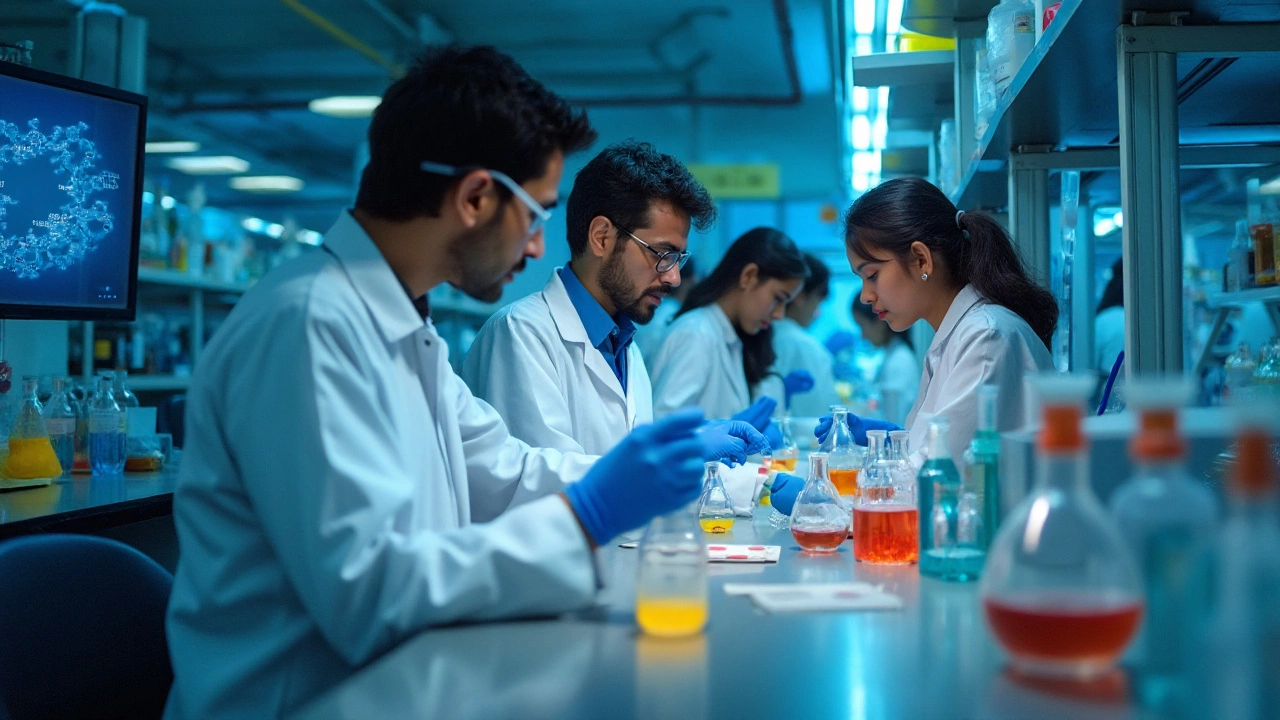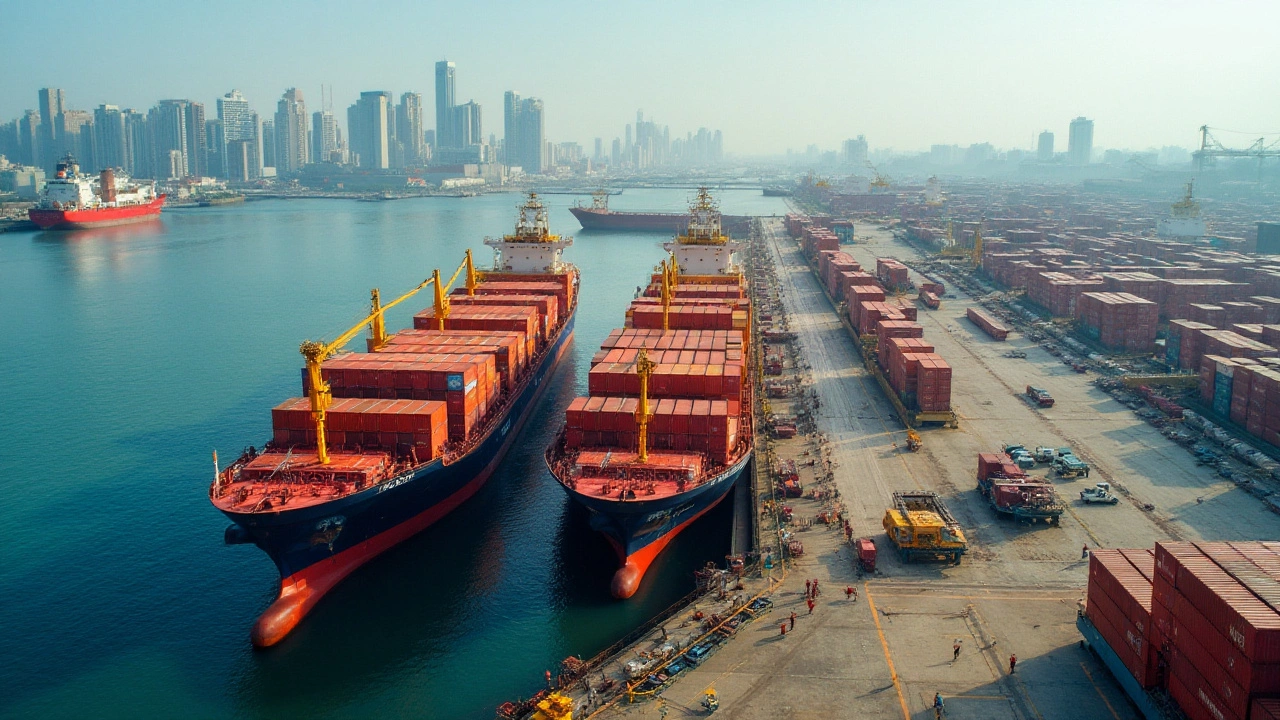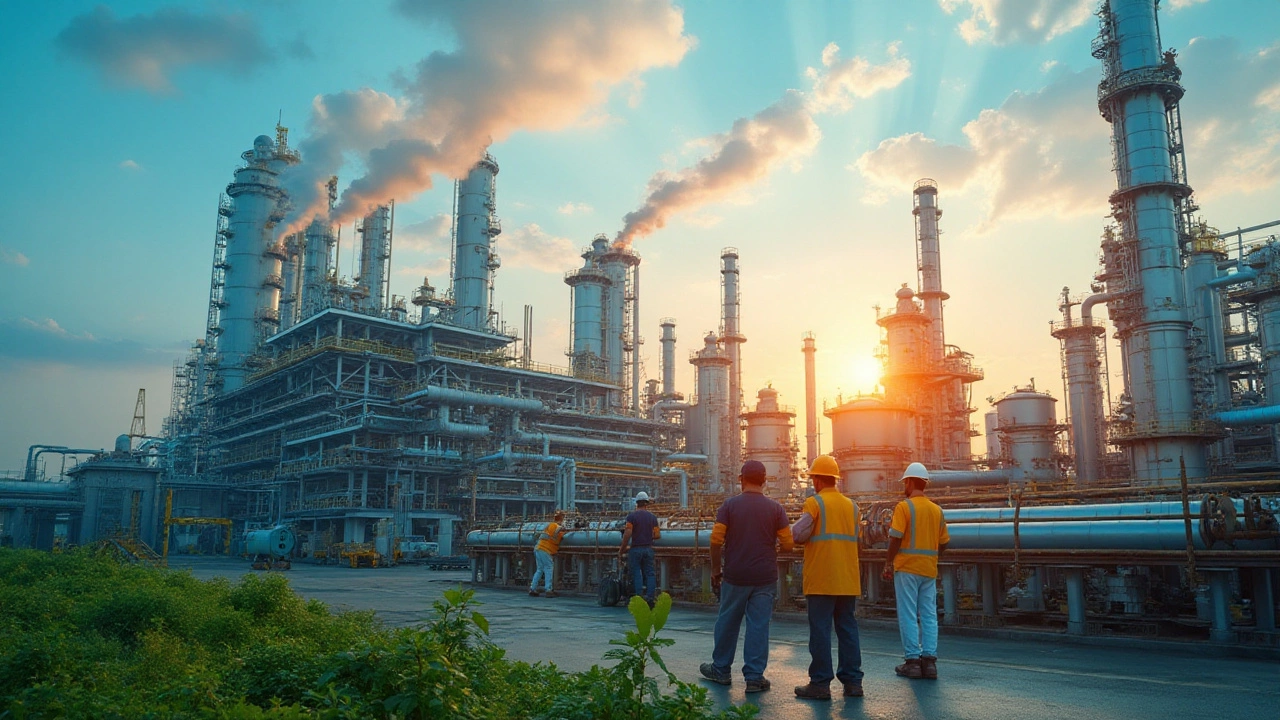India's chemical industry, noted for its significant contribution to the country's GDP, stands as one of the largest sectors globally. Bustling with innovation and growth, it encompasses a diverse range of products with various applications. From pharmaceuticals to fertilizers, the array of chemicals produced here reflects the industry's broad scope.
The Indian chemical manufacturing scene is dotted with numerous players leading the charge in both volume and innovation. They cater not just to the domestic market but also play an influential role in global exports. The industry's evolution is also powered by supportive government policies, skilled human resources, and technological advancements.
With the world leaning towards sustainable practices, India's chemical sector is also evolving to meet these demands. This article delves into the most manufactured chemicals in India, offering insights into their importance and the future landscape of this dynamic industry.
- Overview of India's Chemical Industry
- Most Manufactured Chemicals in India
- Significance of the Chemical Manufacturing Industry
- Leading Chemical Manufacturers in India
- Future Trends and Innovations
Overview of India's Chemical Industry
The chemical manufacturing India sector has established itself as an indispensable facet of the nation's industrial landscape. Holding the illustrious position of being the sixth-largest producer of chemicals globally, India is a pivotal player in this domain. Its growth trajectory is nothing short of remarkable, sparked by the liberalization policies introduced in the 1990s which significantly broadened the industry's horizon. With this momentum, the sector has managed to capture a significant global market share, attracting substantial foreign direct investment. The Indian chemical industry encompasses a broad spectrum of segments such as pharmaceuticals, petrochemicals, agrochemicals, and industrial chemicals, each contributing to the robust structure that underpins the sector.
The industry operates as a backbone to multiple crucial sectors including agriculture, textiles, and construction, providing essential raw materials that spur growth across these fields. Another notable quality of India's chemical industry is its capacity for innovation; it continually evolves to meet changing global demands. This adaptability is crucial, given the increasing need for sustainable practices and the development of green chemistry solutions. Moreover, the sector is supported by a vast pool of skilled professionals and researchers, who channel their expertise to foster innovation and ensure competitive advantage. The Indian government too plays a vital role by implementing favorable policies and supporting infrastructure development, further solidifying the industry's foundation.
Recognizing the industry's importance, initiatives such as the Petroleum, Chemicals, and Petrochemicals Investment Regions (PCPIRs) have been established, which are specially delineated investment regions dedicated to chemicals and petrochemicals. These regions are designed to empower growth and innovation, offering world-class infrastructure and incentives for businesses. In addition, the recent government focus on 'Atmanirbhar Bharat' (self-reliant India) aims to boost domestic manufacturing capabilities and reduce dependence on imports. As the Indian chemical industry continues its upward trajectory, alliances with international partners and savvy adoption of technology are key drivers that are transforming India into a favored destination for chemical manufacturing on a global scale.
According to the India Brand Equity Foundation, the Indian chemical industry was valued at 178 billion USD as of 2019, and it is expected to reach 304 billion USD by 2025. These figures not only underscore the sector's enduring growth but also highlight its potential as an economic powerhouse. Companies increasingly invest in research and development to keep pace with global competitors, ensuring that India's chemical products maintain their appeal in both domestic and international markets. The convergence of these elements underscores the significance of the Indian chemical industry and its promise for a sustainable and prosperous future.
Most Manufactured Chemicals in India
India’s chemical industry is vast, producing a variety of chemical manufacturing India products that serve both local and international markets. One of the most significant products is petrochemicals, which form the backbone of numerous industries, including textiles, agriculture, and pharmaceuticals. These are derived from crude oil and natural gas, creating basic building blocks like ethylene, propylene, and benzene. These raw materials are critical for producing plastics, synthetic rubbers, and fibers, all essential components of modern life.
Another major player in the Indian chemical industry is the production of fertilizers. With India being an agrarian economy, the demand for fertilizers such as urea, phosphates, and potash is consistently high. These nutrients boost crop yields and are crucial for ensuring food security across the nation. Over the years, the Indian government has implemented various initiatives to bolster domestic fertilizer production, reducing reliance on imports and striving for agricultural self-sufficiency.
A noteworthy mention also goes to the country's dye and pigment industry, which sees substantial production volumes given India’s rich tradition in textile production. These chemicals are extensively used in coloring fabrics, paints, and coatings. The dye industry has not only flourished thanks to age-old techniques but has also embraced modern technology to meet international standards. Importantly, India ranks as one of the largest producers and exporters of dyes worldwide.
India also holds a significant position in the specialty chemicals sector, producing products used in end-user oriented goods like health, beauty, food, and automobiles. Specialty chemicals, including surfactants, flavors, and fragrances, have surged in demand due to India’s growing consumer base and industrialization. The sector is hailed for its adaptability, responding to the shifting needs of global markets with innovative solutions.
According to recent data, the chemical industry accounts for substantial employment opportunities in India, contributing to the lively pace of economic development. In a study, it was noted that the chemical sector represents around 7% of the country’s GDP and employs millions directly and indirectly, thereby reinforcing its indispensable role in the national economy. Here is an interesting table showcasing the production of various chemicals and their growth rates over the past decade:
| Year | Petrochemicals | Fertilizers | Dyes | Specialty Chemicals |
|---|---|---|---|---|
| 2014 | 12.5% | 9.3% | 15.0% | 11.2% |
| 2019 | 14.8% | 11.0% | 16.9% | 13.7% |
| 2024 | 16.3% | 13.1% | 18.2% | 15.9% |
The importance of the chemical industry is aptly summarized by the Indian Chemical Council in one of their reports: "India's growth story is intricately tied to its chemical industry, which stands out for its ability to adapt, innovate, and sustain across a spectrum of products, driving sustainable economic advantage for the country."

Significance of the Chemical Manufacturing Industry
The chemical manufacturing industry in India plays a pivotal role in the national economy, both as a direct contributor and as a critical enabler for other sectors. This industry is not only a key component in industrial and agricultural development but also a major factor in the country's trade and export landscape. With its vast array of products—from basic to specialty chemicals—it provides essential raw materials to industries as varied as pharmaceuticals, textiles, paper, and agriculture, acting as the backbone that supports these sectors.
One of the most significant contributions of the Indian chemical sector is its impact on the employment landscape. The industry provides millions of jobs, both directly and indirectly, creating a valuable human resource pool that is skilled, experienced, and vital to economic growth. From research and development to manufacturing and sales, the sector attracts a diverse range of professionals.
Moreover, the industry's export potential is undeniable. India is among the top exporters of chemicals globally, with a strong presence in markets like the United States, Europe, and Asia-Pacific. This export revenue is crucial not only for the companies involved but also for the national economy. As the global demand for chemicals continues to rise, India's role as a leading supplier is likely to expand, offering more opportunities for growth and innovation.
Along with economic and employment contributions, the industry is also a hub for technological progress. Advances in chemical engineering and green chemistry are shaping the future of this industry, as it moves towards more sustainable and eco-friendly practices. By investing in technology, the Indian chemical industry can reduce its environmental impact while boosting efficiency and productivity. This dual focus on sustainability and innovation ensures that the industry remains competitive on the global stage.
Key Drivers and Challenges
Several factors drive the chemical industry forward in India. Government policies and initiatives provide support and motivation for infrastructure development, research funding, and international trade partnerships. However, the sector also faces challenges, such as fluctuating raw material prices, regulatory compliance, and environmental concerns. Addressing these challenges requires a strategic approach, combining government action, industry innovation, and academic research.
"The Indian chemical industry is well poised to capitalize on the opportunities arising from current global trends," said a spokesperson from the Ministry of Chemicals and Fertilizers. "By prioritizing sustainability and technological advancements, we can ensure long-term growth and resilience."
The combination of these elements—economic impact, employment generation, export potential, and technological innovation—highlights the significance of the chemical manufacturing industry in India. Its role as an enabler for other industries cannot be overstated, and its potential for future growth is vast. As India continues to develop and modernize, this industry will undoubtedly remain one of the central pillars of the nation's economic landscape.
Leading Chemical Manufacturers in India
India's chemical manufacturing industry is sprawling, comprising various segments like petrochemicals, specialty chemicals, agrochemicals, and more. Among the vast pool of contributors, several key players have risen to prominence due to their scale of operations, innovation, and global reach. One cannot discuss chemical manufacturers in India without mentioning giants like Reliance Industries, Tata Chemicals, and UPL Limited. Reliance Industries, for instance, is a pivotal figure in the world of chemical manufacturing India. It operates extensive petrochemical units and is known for its advanced production techniques, making it a vital artery in India's industrial framework.
Tata Chemicals, another stalwart, has a legacy that stretches far and wide. It is pegged as one of India's largest chemical companies, specializing in soda ash and industrial salt production. Their innovations in sustainability and efficiency mark them out as a forward-thinking player. The company's commitment to environmental stewardship is underscored by their robust CSR initiatives and a long-term vision for greener manufacturing processes.
Another noteworthy manufacturer is UPL Limited, which has carved a niche for itself in the agrochemical sector. Ranked as one of the top five global producers, UPL's reach extends to over 130 countries. This impressive feat is equally matched by their extensive research and development efforts, aimed at delivering high-quality yet cost-effective solutions to farmers worldwide. The company’s ethos of integrating innovation with sustainability aligns well with the global shift towards environmentally conscious agriculture.
"India's chemical sector offers an immense scale of operation and scope of innovation, contributing significantly to global supply chains," remarked Ananthakrishnan Haridas, an industry expert from the Asian Chemical Magazine.
In addition to these industry behemoths, companies like Aarti Industries and Pidilite Industries contribute richly to the Indian chemical industry. Aarti Industries, a significant player in specialty chemicals, boasts over 200 products and a strong clientele stretching across the globe. Their adaptability to changing market demands and regulatory landscapes underscores their position as a resilient and agile player in the market.
Pidilite Industries, renowned for its consumer and industrial adhesives, exemplifies integration of science with consumer needs. Their flagship product, 'Fevicol,' has become synonymous with glue in India, dominating market shares with an innovative product line that resonates with consumers. With an emphasis on research and localized solutions, Pidilite marries tradition with technology, cementing its position as a leader in India's adhesive market.
Emerging Trends and Future Prospects
As the sector propels into the future, Indian chemical manufacturers are increasingly tapping into new frontiers. There's a surge in demand for environmentally friendly and sustainable chemical solutions, propelling these companies to innovate. Investments in renewable energy sources, waste management, and greener technologies are becoming organizational mainstays. As global environmental regulations tighten, Indian firms are initiating shifts towards sustainable models, ensuring compliance and long-term success on international platforms. The ongoing evolution of digital technologies and automation within chemical plants also promises enhanced efficiency and cost-effectiveness, setting new benchmarks for the sector.

Future Trends and Innovations
As we move into the future, the Indian chemical industry is set to evolve in response to numerous trends and innovations shaping its trajectory. The focus on sustainability is becoming increasingly pronounced, with companies striving to minimize their environmental footprint. This means greater investment in greener technologies and processes that reduce waste, lower emissions, and improve efficiency. Innovations in catalysis, energy-efficient production, and the adoption of renewable energy sources are steps in this direction.
Digital transformation is another significant trend impacting the chemical manufacturing sector. With the advent of Industry 4.0, chemical manufacturers in India are embracing new digital technologies to improve operations and product offerings. The use of IoT, artificial intelligence, and machine learning are driving smarter manufacturing processes. Companies are leveraging big data analytics to optimize their supply chains, improve maintenance schedules through predictive analysis, and enhance overall decision-making.
One of the most promising fields of innovation is biotechnology, which offers novel pathways for developing sustainable products and processes. Biochemical processes allow for the production of chemicals from biological rather than traditional petrochemical sources. This can lead to bioplastics, biofuels, and other bio-based chemicals with a lower carbon footprint. As biotechnology advances, we can expect to see its role in chemical manufacturing grow substantially.
The Federation of Indian Chambers of Commerce & Industry notes, "The chemical industry is poised for unprecedented expansion driven by innovative solutions that not only meet consumer demands but also align with sustainability goals."
Another innovation is the development of specialty chemicals with tailored functionalities. These products are gaining momentum due to their application in numerous industries, including agriculture, automotive, and electronics. Indian manufacturers are increasingly concentrating on R&D to innovate specialty chemicals that offer unique properties, thus adding value and catering to specific customer needs.
A table featuring data from recent studies emphasizes the growth potential:
| Year | Industry Growth Rate | Investment in R&D |
|---|---|---|
| 2022 | 6% | 400 million USD |
| 2023 | 7.5% | 450 million USD |
| 2024 | 8% | 500 million USD |
Innovation in recycling technologies also forecasts an interesting horizon. Effective recycling processes are not only environmentally beneficial but also economically advantageous, as they reduce the reliance on raw materials. These advancements are crucial as the chemical industry seeks to align with global sustainability goals and shift towards a circular economy model.
